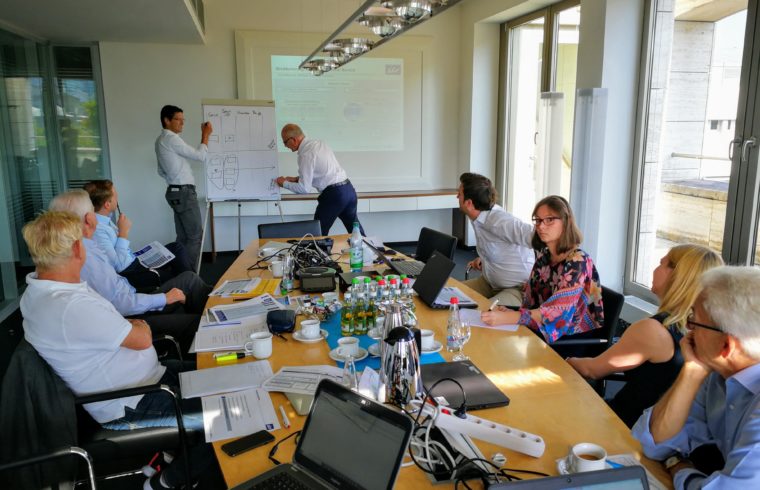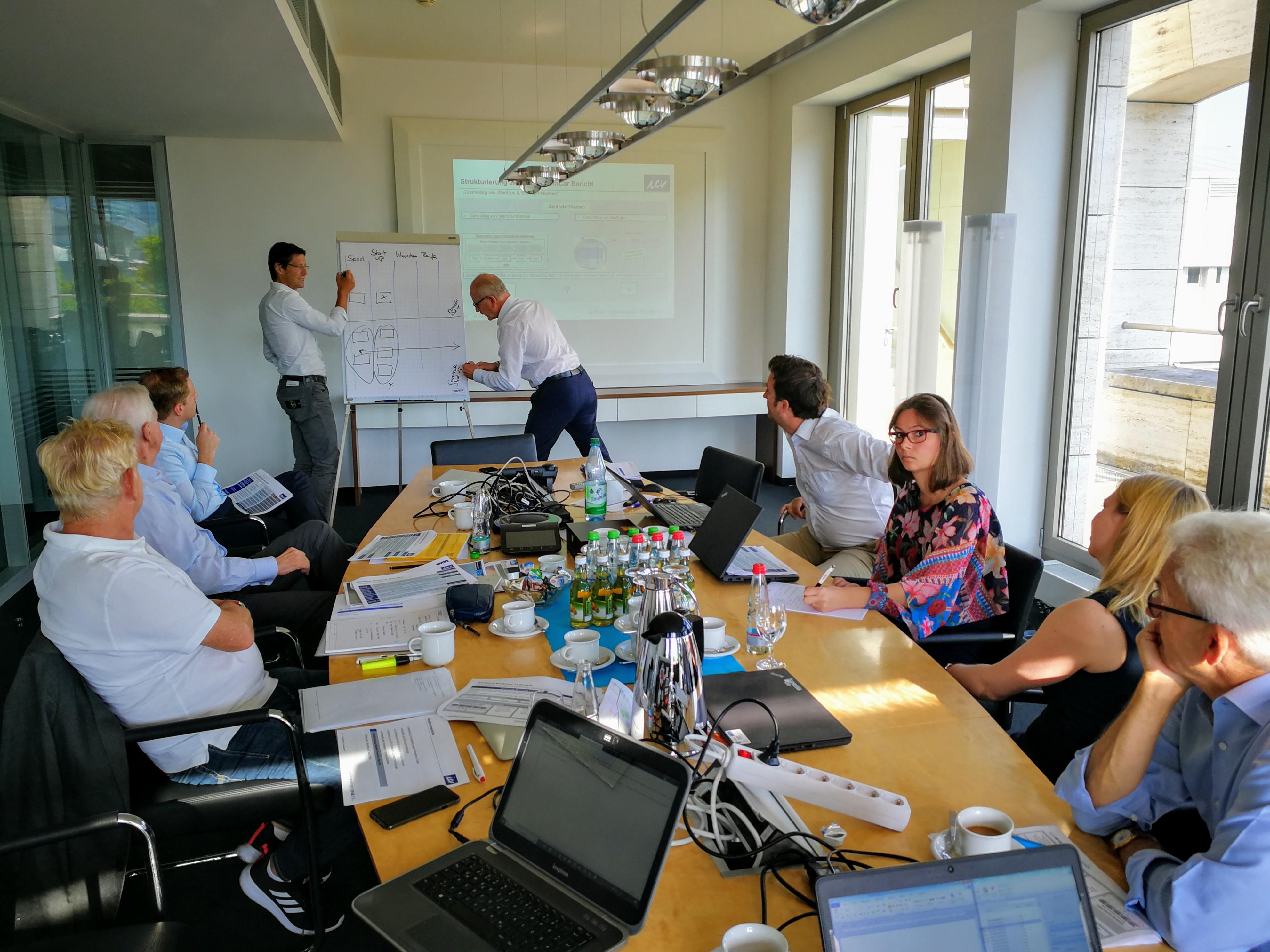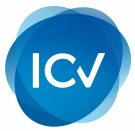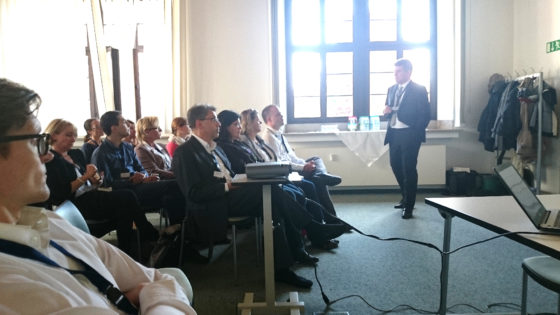„Controlling von Startup-Initiativen“ ist das aktuelle Thema unseres Think Tanks, der ICV-Ideenwerkstatt. Am Donnerstag (20.09.2018) hatte ich erstmals Gelegenheit, die Diskussionen unserer Vordenker bei einem Treffen in den Räumen von Horváth & Partners in Stuttgart live mitzuverfolgen. Impulse zu lebhaften Diskussionen kamen aus höchst interessante Praxisberichten aus dem Bosch-Konzern, der Commerzbank Gruppe und von Viessmann.
 Die Teilnehmer des 21. Arbeitstreffens der ICV-Ideenwerkstatt (v.l.n.r.): Siegfried Gänßlen, Prof. Dr. Dr. h.c. mult. Péter Horváth, Stefan Tobias, Prof. Dr. Heimo Losbichler und Prof. Dr. Ronald Gleich (beide am Flipchart), Dr. Jan Christoph Munck, Deborah Nasca, Carolin Sauter, Karl-Heinz Steinke.
Die Teilnehmer des 21. Arbeitstreffens der ICV-Ideenwerkstatt (v.l.n.r.): Siegfried Gänßlen, Prof. Dr. Dr. h.c. mult. Péter Horváth, Stefan Tobias, Prof. Dr. Heimo Losbichler und Prof. Dr. Ronald Gleich (beide am Flipchart), Dr. Jan Christoph Munck, Deborah Nasca, Carolin Sauter, Karl-Heinz Steinke.
Die ICV-Ideenwerkstatt unterscheidet bei ihrem Jahresthema zwei grundsätzliche Perspektiven: Da ist einerseits die Ausgestaltung des Controllings in Startups verschiedener Entwicklungsphasen und andererseits die Steuerung von Corporate-Open-Innovation-Initiativen (Lab, Incubator, Accelerator). Bei der Corporate-Perspektive geht es um das „Wie?“ der Steuerung einzelner Initiativen und vor allem geht es um die Rolle und Organisation des Controllings. Fragen der Veränderung von Controlling-Anforderungen in verschiedenen Startup-Lebenszyklusphasen werden behandelt und vor allem immer wieder zur Rolle des Controllings sowie zu den Aufgaben und Kompetenzen der Controller. Erfahrungswissen und Erkenntnisse gewinnt unsere Ideenwerkstatt aus Praxisberichten, die zugleich reichlich Stoff für lebhafte Diskussionen liefern. Debattiert wurde z.B. bei diesem Treffen über ein „Innovations-Portfolio-Management“ bei Corporate-Startups und über die Frage, ob und wie hier Controller die Rolle eines Startup-„Investors“ einnehmen.
In der Runde gewährte Carolin Sauter von der grow platform GmbH im Bosch-Konzern Einblicke in die Rolle der Controller in ihrer Corporate-Startup-Welt. Die berühmte „eierlegende Wollmilchsau“ ist hier wohl ein passendes Bild, denn dort sind sie Ansprechpartner für bzw. die Schnittstelle(n) zu Buchhaltung, Jahresabschluss, Compliance, Reporting einzelner Startups bis hin zu Preisbildung, IT- und Prozessberatung, Konzept-Weiterentwicklung. Echte „Alleskönner“ sind also gefragt, die von kleinen operativen Aufgaben bis zur Management-Sitzung bestehen. Die Controller halten den „Intrapreneuren“ den Rücken frei, sind deren „Business Partner“ und nehmen zugleich eine wichtige Rolle gegenüber dem Konzern ein.
Ähnliches berichtet der live zugeschaltete Martin Unger von der WaTTx, einem crossfunktionalen Innovations- und Startup-Beratungs-Team bei Viessmann. Dieses arbeitet kontinuierlich mit einem festen Controller aus der Gruppe zusammen, der z.B. sowohl das „Konto im Auge behält“, als auch im Umgang mit der Hauptorganisation berät und bei der Budgetierung unterstützt. Auch hier wird zur Steuerung mit den Corporate Initiativen „eine Mischung aus qualitativen und quantitativen Zielen“ vereinbart.
Die „Perspektive Investor“ bringt schließlich der ebenfalls live zugeschaltete David Schaeffler vom Main Incubator, der „F&E Einheit der Commerzbank Gruppe“, in die Diskussion der ICV-Ideenwerkstatt. Beim Thema „KPIs“ gibt er zu bedenken, dass es in der Anfangsphase von Startup-Initiativen „eigentlich noch gar keine Zahlen“ gäbe. Nach einer gewissen Zeit werde dann aber „sehr hart in die Zahlen geschaut“. Dem Controlling komme eine Rolle bei der Schließung einer typischen Lücke zu: Es könne dafür sorgen, dass das Zahlenwerk genau dann vorhanden ist, wenn es „Investoren“ z.B. für das Funding fordern.
Viel Erfahrungswissen und Diskussionsstoff nährte die lebhaften Diskussionen unserer Ideenwerkstatt. Die gewonnenen Erkenntnisse dieses und vorangegangener Treffen werden in den Dream-Car-Bericht „Controlling von Startups & Startup-Initiativen“ einfließen. Hier haben die redaktionellen Arbeiten begonnen. Einen nächsten Zwischenbericht wird die ICV-Ideenwerkstatt in ihrem neuen Quarterly demnächst geben.
“Controlling of Start-Up Initiatives” is the current topic of our ICV Think Tank. On Thursday (20.09.2018) for the first time I had the opportunity to follow the discussions of our thought leaders live at a meeting in the premises of Horváth & Partners in Stuttgart. Impulses for lively discussions came from highly interesting practical reports from the Bosch Group, the Commerzbank Group and Viessmann.

The participants of the 21st workshop of the ICV Think Tank (from the left): Siegfried Gänßlen, Prof. Dr. Dr. h.c. mult. Péter Horváth, Stefan Tobias, Prof. Dr. Heimo Losbichler and Prof. Dr. Ronald Gleich (both next to the flipchart), Dr. Jan Christoph Munck, Deborah Nasca, Carolin Sauter, Karl-Heinz Steinke.
The ICV Think Tank distinguishes two fundamental perspectives in its current annual topic: on the one hand, the design of controlling in start-ups at various development phases and, on the other hand, the steering of Corporate Open Innovation Initiatives (lab, incubator, accelerator). The corporate perspective is about the “how” of controlling individual initiatives and, above all, the role and organization of controlling. Questions of changing controlling requirements in different start-up lifecycle phases are dealt with and, above all, questions on the role of controlling as well as the tasks and competencies of the controllers are asked again and again. Our Think Tank gains experience and insights from practical reports, which at the same time provide ample material for lively discussions. For example, there were discussions on “innovation portfolio management” in corporate start-ups at the meeting and the question of whether and how controllers play the role of a start-up “investor” were answered.
During the round, Carolin Sauter from grow platform GmbH at the Bosch Group provided insights into the role of controllers in their corporate start-up world. The famous “swiss army knife” is probably a fitting picture, because there the controllers are the contact persons for or the interface(s) to accounting, annual financial statements, compliance, reporting of individual startups to pricing, IT and process consulting, concept development. Real “all-rounders” are therefore required, who can manage everything from small operational tasks up to the management session. The controllers cover for the “intrapreneurs”, are their “business partners” and at the same time play an important role in the Group.
Martin Unger from WaTTx, a cross-functional innovation and start-up consulting team at Viessmann, reports similar things. It works continuously with a controller from the group and the cooperation consists on e.g. both “keeping an eye on the account” as well as advising on how to deal with the main organization and supporting it in budgeting. Here too, a mix of qualitative and quantitative goals is agreed for the management of corporate initiatives.
Finally, David Schaeffler from the Main Incubator, the “R&D unit of the Commerzbank Group”, connected live, brings the investor perspective into the discussion of the ICV Think Tank. On the subject of “KPIs”, he points out that in the initial phase of start-up initiatives “there are actually no numbers at all”. After a certain time it’s “hard to look into the numbers”. Controlling has a role to play in closing a typical gap: it can ensure that the figures are in the right place when “investors” need them, e.g. for funding.
Much experience and insights fueled the lively discussions of our Think Tank. The lessons learned from this and previous meetings will feed the Dream Car report “Controlling of Start – Ups and Start – Up Initiatives”. Here the editorial work has begun. And the next interim report will be coming soon from the ICV Think Tank in its next Quarterly.


